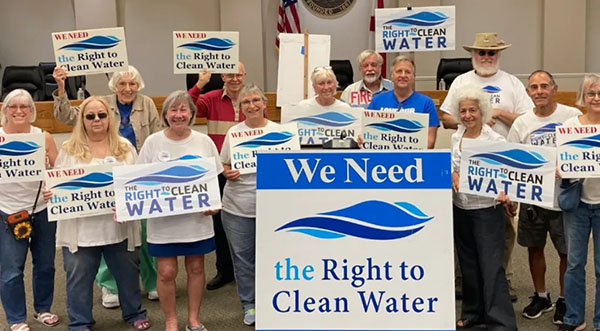Florida 5th District Court of Appeal Rejects Titusville’s ‘Right to Clean Water’ Measure, Citing State Law
By Space Coast Daily // December 29, 2024
court’s three-judge panel ruled that the measure was “preempted” by the 2020 state law

BREVARD COUNTY • TITISVILLE, FLORIDA – A Florida appeals court has struck down a voter-approved measure that sought to establish a “right to clean water” in Titusville, siding with the city in a decision that pits local environmental priorities against state-level restrictions.
In a ruling issued Thursday, the 5th District Court of Appeal upheld a challenge from the city of Titusville, which argued that the 2022 charter amendment violated a state law passed in 2020. That law preempts local governments from granting legal rights to natural elements, such as bodies of water or ecosystems, and restricts local measures that extend individual rights beyond those recognized by state law.
The controversial measure, which was approved by 83% of voters in Titusville, sought to enshrine the right to clean water for residents and protect the Waters of Titusville—a term used to describe local rivers, lagoons, and other water bodies—ensuring they remain free of pollution and preserve their natural, healthy state.
Under the amendment, any resident could file lawsuits for themselves or the community to prevent violations and seek legal remedies for environmental damage.
However, the court’s three-judge panel ruled that the measure was “preempted” by the 2020 state law, which prohibits local ordinances from granting legal rights to natural elements beyond what is allowed by Florida’s Constitution or general state law.
Court Opinion: Legal Rights Not Recognized in State Law
The judges—John Harris, Joe Boatwright, and John MacIver—concluded that the local amendment created rights that were not authorized by the state constitution or any existing state law. In their written opinion, they argued that while the goal of the amendment was “admirable,” there was no legal basis for allowing citizens to file lawsuits in the name of a body of water or to establish rights that extend beyond what Florida law currently provides.
“Although it is an admirable goal, we know of no provision that is authorized in either general law or specifically granted in the state Constitution … that gives a citizen the right to have a body of water that ‘flows, exists in its natural form, is free of pollution, and which maintains a healthy ecosystem,’” the opinion stated.
The decision represents a blow to environmental advocates, many of whom argue that local control over environmental issues is critical for addressing ongoing challenges such as water pollution and ecosystem degradation in the region.

Environmental Advocates React
The ruling has sparked widespread criticism from environmental groups and community leaders, who argue it severely limits local efforts to protect the region’s waterways. Titusville, located along the Indian River Lagoon, has faced significant water quality issues in recent years, including sewage spills and nutrient pollution, which have contributed to the ongoing ecological crisis in the lagoon and other local waterways.
In 2021, a major protest at Titusville City Hall highlighted growing concerns about the quality of the waters surrounding the city, particularly following a series of sewage discharges that impacted the Indian River Lagoon—a critical estuary that supports both marine life and the local economy.
“This is a devastating setback for residents who care deeply about the future of our waters,” said Jessica Ortiz, a spokesperson for Speak Up Titusville, the advocacy group that spearheaded the charter amendment. “The Indian River Lagoon and other local waters are in crisis, and we need every tool at our disposal to protect them. This decision places that power out of our hands.”
Despite the court’s ruling, the organization has not ruled out further legal challenges. “We’ll explore all avenues, including state-level advocacy, to push for stronger protections for our environment,” Ortiz said.
Local vs. State: A Growing Conflict
The ruling highlights the growing tension between state lawmakers and local governments over environmental regulation. In recent years, Florida’s state legislature has passed a series of laws that limit local governments’ authority to enact measures that exceed state-level protections. These preemptive laws have been particularly controversial in environmental areas, where local communities often have a more direct stake in protecting natural resources.
“The state continues to overrule the will of local communities and undermine local control,” said Carl Stevenson, an environmental attorney based in Orlando. “In a state with such diverse environmental challenges, it is crucial for municipalities to have the ability to address issues in ways that work for them.”
With the court’s decision, the case is being sent back to Brevard County Circuit Court, where judgment will be entered in favor of the city. Titusville officials have expressed their commitment to addressing water quality issues through other means. Still, city leaders will likely face continued pressure from residents and environmental advocates to find solutions.













